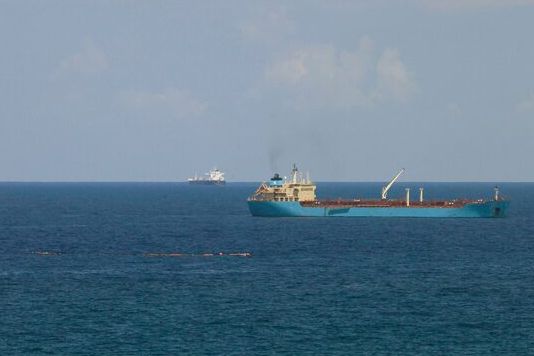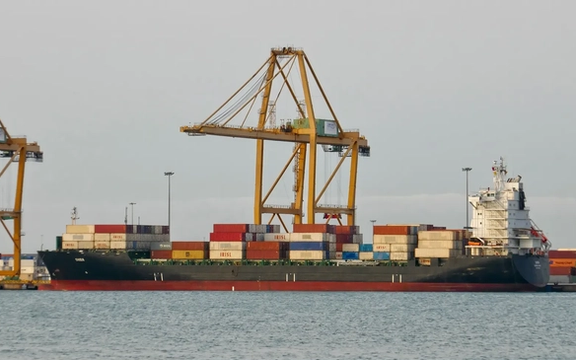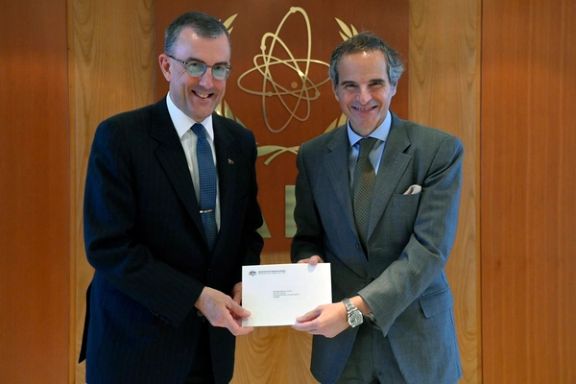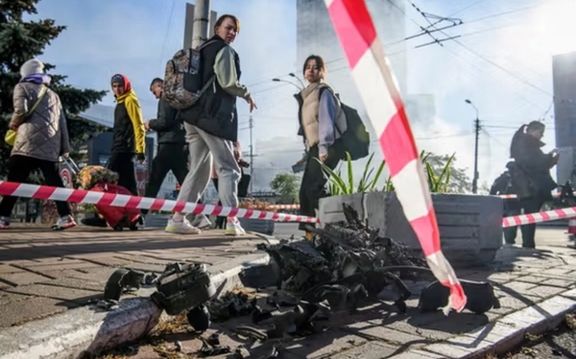Iranian biotech entrepreneur nominated for German start-up award

Iranian biochemist Ghazaleh Madani has been nominated for the German Start-up Award as 'newcomer of the year' for her work with cancer research.

Iranian biochemist Ghazaleh Madani has been nominated for the German Start-up Award as 'newcomer of the year' for her work with cancer research.
Madani, 29, is one of three finalists for the category, as announced by the German Start-up Association, and from over 400 applications, a 27-member jury nominated 24 individuals including the young Iranian.
According to a report by German newspaper Tagesspiegel, Madani completed her medical studies at the Isfahan University of Medical Sciences before leaving Iran in 2020 Iran due to the political situation in the country without providing further details.
She studied biochemistry and molecular biology at the University of Potsdam and received her master's degree in 2023.
Tagesspiegel's report quoted Madani as saying that she dedicated herself to cancer research because she herself had lost several family members to the disease.
Her start-up, CanChip, specializes in developing 3D tumor models for cancer research.
Award finalists represent a wide range of industries, including medical technology, AI, sustainability, and engineering. The awards ceremony is scheduled to take place next month on May 22.

Iranian Revolutionary Guard naval forces seized two foreign oil tankers in the Persian Gulf on Monday, state media reported, accusing them of smuggling diesel fuel.
The tankers were intercepted in a maritime operation by the Islamic Revolutionary Guard Corps (IRGC) Second Naval District and are now being transferred to the port of Bushehr.
“The two tankers, with a total of 25 crew members, were systematically involved in fuel smuggling in the central waters of the Persian Gulf and were collectively carrying over three million liters of smuggled diesel fuel,” read a statement by the IRGC unit.
“These two tankers were systematically engaged in fuel smuggling and were identified through intelligence monitoring by IRGC naval forces,” the statement added. “They are now being moved to the Bushehr oil pier under judicial order for fuel confiscation.”
The IRGC regularly announces such seizures, citing efforts to combat fuel trafficking in the Gulf.
In April 2023, the Iranian Navy seized the Advantage Sweet, a Marshall Islands-flagged oil tanker, in the Gulf of Oman, alleging it had collided with an Iranian vessel.
Similarly, in January 2024, Iran seized the St. Nikolas (formerly known as Suez Rajan), another Marshall Islands-flagged tanker, in retaliation for the US confiscation of its oil cargo the previous year.
In 2019, the Revolutionary Guards seized the British-flagged oil tanker Stena Impero in the same waterway for allegedly ramming a fishing boat and released it two months later.
Iran has frequently justified such actions by citing fuel smuggling, maritime violations or reciprocal measures.
Iran and the United States have traded barbs in recent years over a spate of incidents in the sensitive waters of the Persian Gulf, through which much of the world's energy supplies passes.

Iranian container ships are suspected of aiding Houthi attacks and transporting weapons to Syria and Russia during repeated visits to the port of Antwerp, investigative outlet Follow the Money (FTM) reported citing Western security services.
The report details how Iranian ships may have used commercial trade through Antwerp to conceal alleged illicit activities.
The vessels delivered arms, weapon components and cargo with dual civilian and military uses during stopovers in Syria and Russia en route to Belgium, the Western security sources cited by FTM were cited as saying.
In Syria, under recently ousted President Bashar al-Assad, these shipments were likely passed on to Lebanon’s Hezbollah militant group, the report added citing unnamed intelligence sources.
Six Iranian ships regularly docked in Syria while travelling between Iran and Antwerp between mid-2022 and late 2024, FTM reported, citing shipping data.
One ship, the Shiba, lingered off Yemen during multiple Houthi attacks, and made at least one unregistered “dark port” call to Syria, FTM said.
The ships were operated by Hafez Darya Arya Shipping (HDS), which is suspected to be a front for Iran’s sanctioned state shipping firm IRISL, the report said.
Belgian authorities inspected one vessel in 2024 but found no weapons, FTM reported. The EU banned the ships from its ports in late 2024 after sanctioning IRISL.

Australia's former ambassador to Iran was the target of an assassination plot in 2019 in Tehran, the Australian news outlet SBS reported citing leaked Iranian judicial documents.
The plot, which had not previously been reported, did not appear to involve the Iranian state in any way despite its fraught relationship with US-allied countries.
An Iranian man whom SBS News identified as Kamran - a pseudonym used for privacy reasons - attacked the Australian embassy in Tehran with a Molotov cocktail and later followed the ambassador Ian Biggs with the intent to kill him.
Kamran was arrested before carrying out the attack and was later jailed for 17 months although he was released on parole in 2020, the report said.
The leaked documents, provided to SBS by the Iranian hacktivist group Edaalate Ali, come from a cache of over three million files detailing cases tried in Tehran's Revolutionary Court between 2008 and 2023.
Among these included documents relating to the plot against Biggs, revealing that Kamran’s actions began with setting off a firecracker, followed by throwing two Molotov cocktails and then attempting to purchase a handgun with the intent to murder the ambassador, the report added.
According to the documents cited by SBS, Kamran was charged with “collusion and conspiracy with the intent to act against national security through a plot to commit an act of terror and murder Australia's Ambassador.” While Kamran hired two accomplices, the report said they were later released due to insufficient evidence.
Assailant’s sentence and release
Despite the severity of the charges, Kamran’s sentence was reduced from six years to under four years after he requested a pardon, the report said. However, the decision to reduce the sentence was later withdrawn. Kamran was ultimately paroled after serving just under 18 months in 2020, the report added.
While Kamran’s motivations are not fully clear, the report said he claimed personal grievances related to his time in Australia, including allegations of sexual harassment and financial struggles.
Biggs served as Australia's ambassador to Iran from May 2016 until 2019. During this period, the relationship between Australia and Iran was affected by the Joint Comprehensive Plan of Action (JCPOA), the 2015 nuclear deal aimed at limiting Iran's nuclear program in exchange for sanctions relief.
According to the report, Biggs publicly backed the nuclear deal, and Australia’s position on the deal was aligned with much of the international community at the time.
In May 2023, Biggs assumed the role of Australia's Ambassador to Austria. He also took on responsibilities as Australia's Resident Representative and Governor on the IAEA Board of Governors, Permanent Representative to the United Nations in Vienna, and to the Comprehensive Nuclear-Test-Ban Treaty Organization (CTBTO) Preparatory Commission.
The Australian government, including the Department of Foreign Affairs and Trade (DFAT) and the Australian Federal Police, declined to comment on the incident, the report said.

The United States on Wednesday moved to further impede Iranian access to American technology by adding two Iran-linked entities to its export blacklist, citing their alleged role in procuring parts for Tehran’s drone and missile programs.
The action is part of a sweeping update to the Entity List announced by the US Department of Commerce's Bureau of Industry and Security (BIS), targeting 80 companies and organizations across China, Iran, and several other countries.
“American technology should never be used against the American people," Under Secretary of Commerce for Industry and Security Jeffrey Kessler said in a statement.
The department said the changes aim to block sensitive US goods and technologies from reaching foreign militaries or intelligence services.
"BIS is sending a clear, resounding message that the Trump administration will work tirelessly to safeguard our national security by preventing US technologies and goods from being misused for high performance computing, hypersonic missiles, military aircraft training, and UAVs that threaten our national security.”
The Commerce Department did not name the Iranian entities publicly in its initial announcement but said two entities in Iran and China were “attempting to procure US-origin items for Iran’s defense industry and unmanned aerial vehicle programs.”
Also listed was Dart Aviation, a company previously sanctioned for re-exporting US goods to Iran, now updated with new aliases and addresses.
The Iranian government has consistently denied Western accusations about its drone exports to Russia and other parties. Officials in Tehran say the country’s military programs are purely defensive, though its UAVs have been displayed in multiple conflict zones including Ukraine, Iraq, and Syria.
“We will not allow adversaries to exploit American technology to bolster their own militaries and threaten American lives,” Howard Lutnick, the US Secretary of Commerce said.
The US Treasury in February levied sanctions on six entities in Hong Kong and mainland China it said facilitate the acquisition of parts for armed drones produced by Iran, as part of Washington's "maximum pressure" campaign on Tehran.
The entities, the Treasury said, acquire parts for US-sanctioned Iranian firm, Pishtazan Kavosh Gostar Boshra, and its subsidiary company Narin Sepehr Mobin Isatis, which it said supplied Iran's drone and ballistic missile programs.

The United States on Tuesday sanctioned three senior Iranian intelligence operatives accused of playing a role in the disappearance and presumed death of retired FBI agent Robert Levinson, who vanished in Iran over 17 years ago.
“The United States will also continue our relentless efforts to secure the release of all US nationals who are held hostage or wrongfully detained abroad and reunite them with their loved ones. We condemn Iran’s longstanding record of unjust detentions of and lethal plotting against US nationals,” said Tammy Bruce, spokesperson for the US State Department.
She called Iran’s continued detention of US nationals and involvement in lethal operations “a longstanding pattern of unacceptable behavior.”
The three men—Taqi Daneshvar, Reza Amiri Moghaddam, and Gholamhossein Mohammadnia—are now listed on the US Treasury’s Specially Designated Nationals (SDN) list.
All are linked to the Iranian Ministry of Intelligence and Security (MOIS), a body the US describes as instrumental in hostage-taking and overseas plots targeting Americans.
The move builds on the December 2020 sanctions against two other MOIS officers, Mohammad Baseri and Ahmad Khazai, for their alleged roles in Levinson’s detention.
Levinson, who disappeared in 2007 from Iran’s Kish Island while on an unauthorized CIA mission, is believed by US officials to have died in Iranian custody, though Tehran has never acknowledged holding him.
Iran has repeatedly denied involvement in Levinson’s case. Iranian officials did not immediately comment on Tuesday’s sanctions.
The US offered a reward of up to $20 million for information leading to Levinson’s recovery or the identification of those responsible for his fate. The State Department said its Rewards for Justice program remains active.
Due to the sanctions, any assets the men hold under US jurisdiction must be frozen, and Americans are generally prohibited from engaging with them. Foreign individuals who do business with them also risk being blacklisted.
“Iran’s treatment of Mr. Levinson remains a blight on Iran’s already grim record of human rights abuse,” Treasury Secretary Scott Bessent said in a statement. “The Department of the Treasury will continue to work with US government partners to identify those responsible and shine a light on their abhorrent behavior.”
The Treasury Department added that all three sanctioned individuals were involved in the abduction, detention, and likely death of Levinson, as well as in attempts to conceal Iran’s role in the case.
The sanctions are being imposed under an executive order signed by former President Joe Biden, aimed at holding terrorist organizations, criminal networks, and other “malicious actors” accountable for taking hostages for financial or political gain.
The sanctions come amid heightened scrutiny of Iran’s detention practices, including the cases of several dual nationals held on security charges widely viewed by Western governments as politically motivated.